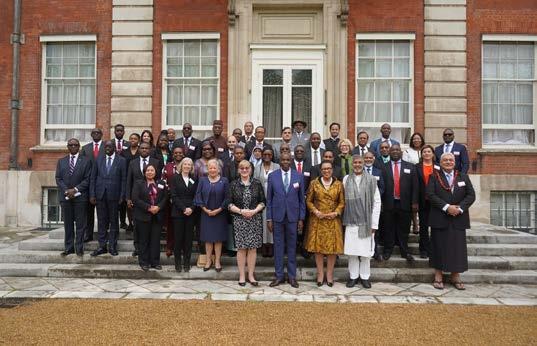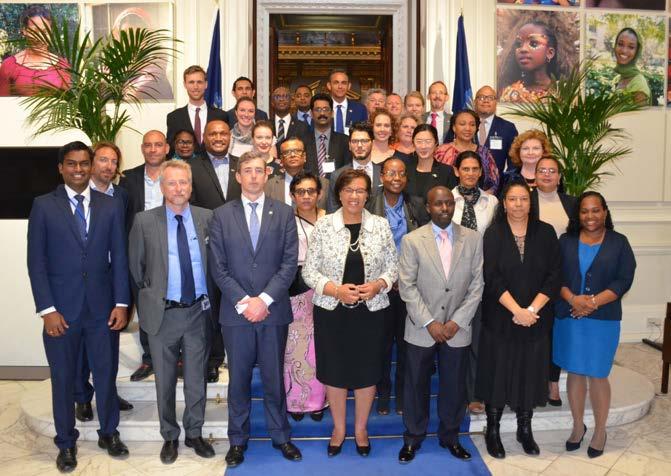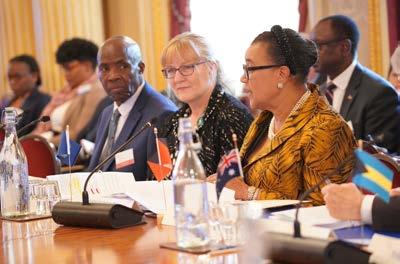
12 minute read
Reflections on the 75th anniversary of the 'modern' Commonwealth: Commonwealth Secretary-General
The Commonwealth Secretary-General reflects on the progress made as the Commonwealth marks 75 years since its establishment.
Rt Hon. Patricia Scotland, KC has been the Secretary-General of the Commonwealth since April 2016, and she serves the 56 governments and 2.7 billion people of the Commonwealth. Born in Dominica, she moved to the UK at an early age. She has pursued a dynamic career in law, public service and politics. A lawyer by profession, she became the youngest woman ever to be appointed Queen's Counsel and is the only woman since the post was created in 1315 to be Attorney-General for England and Wales. Appointed to the UK House of Lords as Baroness Scotland of Asthal in 1997, she has been Alderman for Bishopsgate Ward in the City of London since 2015.
In his powerful address to the UN General Assembly on 25 March 2024, Professor Sir Hilary Beckles, Vice-Chancellor of The University of the West Indies (The UWI), lauded the ‘super-humanity’ of Martin Luther King and Nelson Mandela.
They have always been two of my heroes – I’m sure that is true for all of us – and today, I call to mind Madiba’s words: “remember to celebrate milestones as you prepare for the road ahead.”
On 26 April 2024, we celebrated the 75th anniversary of the ‘modern’ Commonwealth. Today, we reflect on the importance and impact of that moment 75 years ago when eight leaders convened in the aftermath of the Second World War, at the outset of the Cold War and still standing in the long shadow of Empire, to bring a touch of healing to relationships which were changing but remained so important.
In the Commonwealth, they created an association of nations that has not simply survived but grown and thrived. They formalised a set of connections which have evolved into an established framework for global leadership. They gave us the foundations to face the challenges of the world with strength and purpose. In doing so, they confounded history, and they changed the world.
Her late Majesty Queen Elizabeth II observed a Commonwealth which “bears no resemblance to the empires of the past - an entirely new conception, built on the highest qualities of the spirit of man: friendship, loyalty and the desire for freedom and peace – and an equal partnership of nations and races.”
Queen Elizabeth II was right. From that initial group of eight, the Commonwealth today stands as a voluntary association of 56 independent sovereign states, spread across five continents and six oceans. At 2.5 billion people, 60% of whom are under the age of 30, we encompass around a third of the world’s population.
The Commonwealth comprises developed and developing economies; island states and land-locked states; some of the largest populations of any country in the world, and some of the smallest; five of the 10 fastest growing cities on the planet, and some of the most remote indigenous communities.
33 of our members are small states, of which 25 are Small Island Developing States. 15 of our 56 member states retain constitutional links with the Monarchy of the United Kingdom; 36 are Republics; five have Monarchies of their own; and four were never part of the British Empire.
Each of our member states is different, with a different history, and different experiences. However, each is united in active, engaged membership of the ‘modern’ Commonwealth, bound by the blend of practical advantages, common interests and shared values which makes the Commonwealth unique.
Arising from all this is an essential truth; the Commonwealth is the world’s largest association of democratic nations – and the most significant grouping of countries in the history of the world – which is bound, above all, by values to which we all aspire: the values enshrined in our ground-breaking Commonwealth Charter.
The strength of our combination of advantages, interests and values shines in the fact that, with a multilateral system under strain, the Commonwealth as a multilateral organisation is growing precisely because of what we stand for and what we can deliver. This is special.
Sometimes, our experience is uncomfortable – I understand that. There is no escape from the truth that the Commonwealth’s story is one of a family at times scarred by old hurts and resentments. Why would countries which were former colonies willingly decide to create such a union based on equality and friendship? I asked my father the same question. The answer is a combination of principle and practicality which means that the reality of the modern Commonwealth is remarkable and hopeful precisely because of our difficult history.
Today, we meet as equals. We have difficult conversations in a constructive spirit; and we face the world’s challenges together. This has been the Commonwealth’s hallmark. You can see it in our collective refusal to turn a blind eye to apartheid; you can see it in the ground-breaking Lusaka Declaration on Racism in 1979; you can see it in the Langkawi Declaration on the Environment in 1989, which paved the way for the first Earth Summit.
You can see it in the Commonwealth Leaders Statement on Climate Change ahead of the Paris Agreement in 2015, which paved the way for the Paris Agreement; you can see it in the landmark reference to 'loss and damage' in the 2022 CHOGM Communique, which set the tone for global agreement at COP27; you can see it in the Commonwealth Charter, which created the framework for the UN Sustainable Development Goals; and you can see it in our continuous, tireless fight for the small, the vulnerable and the marginalised.
Nelson Mandela said: “The Commonwealth makes the world safe for diversity.” Indeed, the modern Commonwealth is an enigma of diversity and equality. If it wasn’t like this – if it didn’t so confound its own history, and if it were not brave enough to look evil straight in the face and call it what it is – then it would not survive, and I certainly would not be the Commonwealth Secretary-General.
The Commonwealth’s interventions have been ground-breaking and have often shifted the dial. Today, in the face of the enormous challenges which are thrust upon us, we must have the courage to break new ground and shift the dial again. We are living in a world which is under enormous pressure; tightly bound by a tangled knot of crises spanning global systems. A world still living with the social, political and economic consequences of COVID-19. A world of crippling debt, inflation and high interest rates and of spiralling costs for food and energy. A world which is rocked by the tremors of instability and conflict. In which the process, culture and institutions of democracy are under threat. As we attempt to navigate these straits, all the time, our nations are buffeted by the increasingly harsh impacts of climate change. Each of these challenges can be characterised as a grave and serious crisis and they interconnect, entwine and worsen one another. What we feel in our lives is the relationship between these crises and the unique political, economic, social and geographical circumstances – and inequalities – of the societies in which we live.
However, the world has faced grave challenges before. What defines our present predicament as unique is the lack of single causes and single fixes. The way in which human activities have pushed the planet’s ecological systems so far out of balance that all other global systems are in danger; from the production of food and energy to finance, trade and international security.
What makes it so intractable are the dilemmas it creates, where attempts to resolve one crisis worsens another, such as when poverty reduction measures increase fossil fuel emissions. How do we respond to these challenges? What role is there for the Commonwealth in the eye of such a storm?
After eight years as Commonwealth Secretary-General, it is clearer to me than ever that we require a level of international political and economic cooperation which is unprecedented in this century. Yet these crises are manifest at a time when the multilateral system is under immense pressure. Indeed, they contribute to that pressure. The world feels as though it is fracturing. In an increasingly polarised environment, people are anxious about the capacity of governments and international institutions to provide the leadership and action required. It is precisely in a context such as this that the Commonwealth can mobilise its greatest qualities. The world today insists that we are dependent on each other.
“ The Commonwealth’s interventions have been ground-breaking and have often shifted the dial. Today, in the face of the enormous challenges which are thrust upon us, we must have the courage to break new ground and shift the dial again. We are living in a world which is under enormous pressure; tightly bound by a tangled knot of crises spanning global systems. ”

75 years of friendship, connection and common action mean something. We are blessed with the ingenuity and imagination of a third of the world’s population, including one and a half billion people under the age of thirty. Our shared humanity contains an immensely precious diversity of thought, culture, tradition and experience. Our Commonwealth Charter, which gives expression to our defining values – peace and justice; tolerance, respect and solidarity; care for our environment, and for the most vulnerable among us – is not simply a list of ideals. It is an imperative to act, and to make a practical difference in the lives of the 2.7 billion people who call the Commonwealth home.
Whether on climate change and biodiversity loss, youth opportunity and education, global health or economic co-operation, the Commonwealth can play – and does play – an indispensable role in the most pressing issues of our time offering us unparalleled strength not merely to face the future, but to build it.
The credibility of the Commonwealth, and our leadership, lies in our programme of practical action, support and assistance for our member states – which is more comprehensive today than at any other time in our 75-year history. This support is hard-headed, responsive and ambitious. The Commonwealth’s work to protect the process, institutions and culture of democracy – as well as our quiet but-essential work for peace – serves not just the Commonwealth, but the wider world.
It is important that we use the opportunity of this 75th anniversary to reflect. The point of looking back is to enable us to look forward with more knowledge, with a deeper understanding, and with a sharper insight into what comes next. If our history teaches us anything, it is that we do not always know what challenges we are going to face.
My reflection after eight years as Commonwealth Secretary-General is that the very fact of the polycrisis we are living through shows us that, for governments, multilateral institutions, businesses and civil society, ‘business as usual’ is not enough. It is not enough to simply manage the impact of our problems. It is not enough to simply react to the next challenges. If that is our approach, we will be locked in an ever-descending spiral. We must innovate. We must transcend. We must build a better future by rediscovering our confidence in humanity’s ingenuity, and combining it with the hardheaded strategies which can unleash it.
By the time we reach our next Commonwealth Heads of Government Meeting in Samoa in October 2024, we will have developed the world’s most dynamic and comprehensive political and economic framework for harnessing the best of technological change to deliver real results for all of our 56 countries and its 2.7 billion people.

Due to our natural advantages and unique blend of strengths, the Commonwealth is uniquely placed to achieve this, because of our shared interests, our practical similarities in language, common law, regulatory coherence, business procedures, and our large and dynamic diaspora communities. Above all, because we have a unique capacity to load the technological transformation with our values.
This 75th anniversary of the ‘modern’ Commonwealth is a special opportunity to renew our commitment to ensure that they do not simply represent words on a page, but the lived experience of all –now and for generations to come. Our extraordinary potential is more than equal to the challenges we face. Each of the 27,393 days since the birth of the ‘modern’ Commonwealth – good days and bad days – has brought us to this point of incredible opportunity.
The Commonwealth can bring people together, drawing strength and inspiration from what we share, to create a genuinely durable future; in which no one is left behind; in which the goal of a more secure, peaceful, fair, advanced and sustainable world for everyone, everywhere is advanced; and in which we can all enjoy the kind of prosperity which is in harmony with nature and that will also secure our unique and only planet for generations to come.
The incredible connections between our nations have sustained and enriched us for more than seven decades. The Commonwealths’ commitment to peace, progress and opportunity will sustain us for many more. This is our history, our promise, our experience and our aspiration. So let us continue to stand together, and strive together, in restless and practical pursuit of the global common good.





